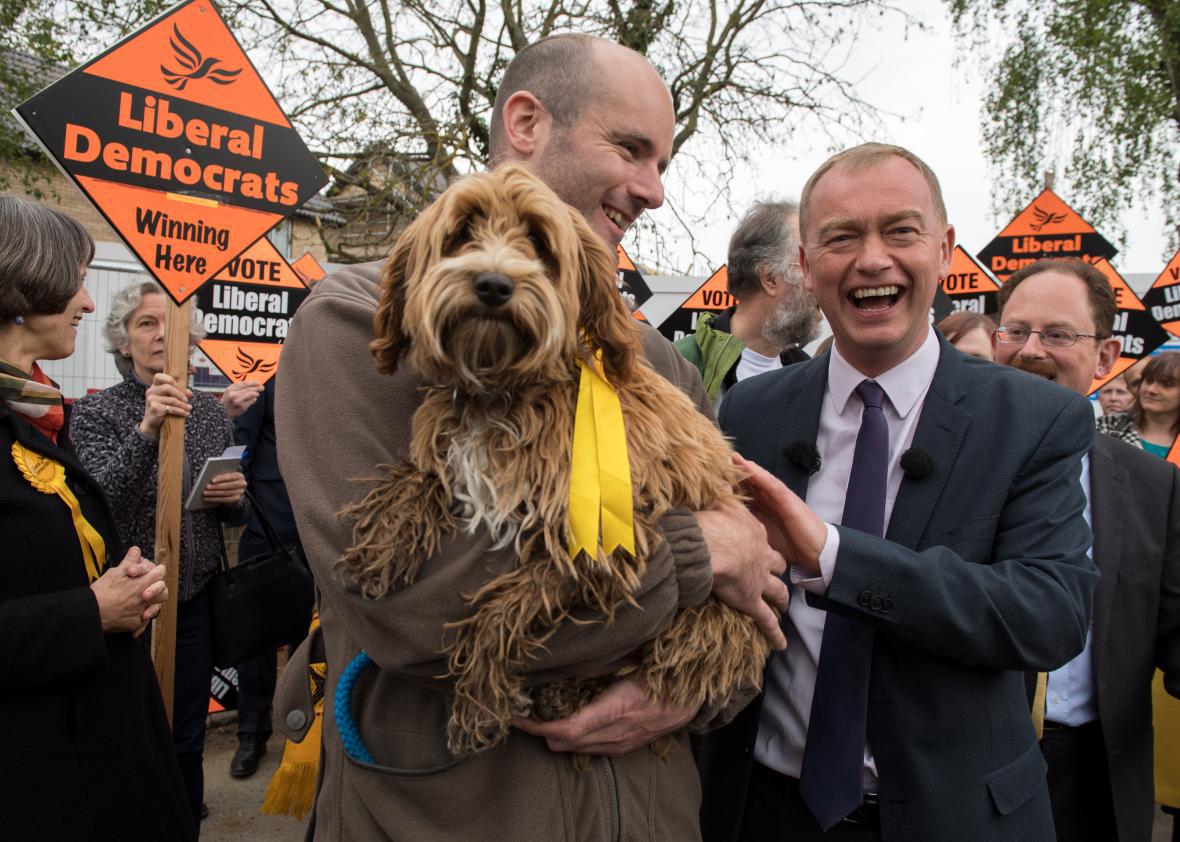Sodomy probably wasn’t what Tim Farron, leader of Britain’s Liberal Democrats, thought he’d be talking about during his first week on the campaign trail. After all, when on April 18 Prime Minister Theresa May called a parliamentary election for June 8, she did so ostensibly to secure an endorsement from the people before negotiations with the European Union on Britain’s exit begin in earnest. Farron, who has sought to position the Liberal Democrats as the anti-Brexit party in contrast to the pro-Brexit Conservatives and Brexit-confused Labour, could reasonably have expected Europe would be the order of the day. Alas, sodomy.
It all came back to comments Farron made in 2015. An evangelical Christian, he told an interviewer “we are all sinners” when asked whether he believed gay sex to be a sin. Asked the same question on April 18, Farron said, “I’m not in the position to go making theological announcements.” Twenty-four hours later, once those interviews had blossomed like a corpse flower into a minor political affair, Farron changed tack. “I do not” believe gay sex is sinful, he declared the next day in the House of Commons, as well as in interviews with the Guardian and BBC.
Given that it is desirable in a democracy to separate the theological from the political, it didn’t seem to matter that Farron has an imperfect yet acceptable voting record on LGBTQ rights, including marriage equality. At the time of the offending 2015 interview, he was on record as supporting the right of trans people in marriage and further regulation of so-called conversion therapy. Today, the Liberal Democrats favor making PrEP available on the National Health Service, ending the ban on gay men donating blood, and introducing ‘X’ as a gender marker in passports.
Arguably Farron, whatever his religious beliefs, has the least to answer for of all three main party leaders on this particular subject. May’s voting record on gay rights from the time she was an opposition MP in the late 1990s and early 2000s, for example, is an abomination. She voted no on equalizing the age of consent between homo- and heterosexual people, no on adoption by same-sex couples, and no on repealing the notorious Section 28 provision, which prohibited discussion of homosexuality in schools.
It was also a bit rich of the commentator Owen Jones to pile on Farron when Jeremy Corbyn, for whom he relentlessly cheered when he ran for Labour’s leadership in 2015, has taken money from Iranian state broadcasters. Though Iran applies the death penalty for homosexuality, between 2009 and 2012 Corbyn appeared five times on Press TV, earning about $27,000 in the process. Corbyn has never satisfactorily answered why he took that money, nor why he referred to Hamas and Hezbollah—neither exactly pro-LGBTQ, one might say—as his “friends.”
The whole thing was a farce, a tempest in a teacup benefitting an election with an inevitable outcome, completely devoid of red meat. This election, after all, ought to be about the nitty-gritty of Brexit. The country will no longer be a member of the EU by late March 2019. Much has to be decided before then about the future U.K.–EU relationship—the rights of British and European citizens; Britain’s outstanding membership dues; legal, customs, and financial regulations, and on and on—and the window of time within which all this can be ironed out contracts with each passing day.
Instead we have vagueness, pabulum, and obfuscation. May has resorted to repeating, ad nauseam ad infinitum, that the country needs to come together and back her strong and stable leadership at a time of national interest—another way of saying that dissent is unpatriotic—without getting into what constitutes Britain’s national interest. She says she wants to “strengthen Britain’s negotiating position to ensure we get the best Brexit deal possible,” but in the absence of specificity, what she’s really asking for is a blank check.
The Labour Party, meanwhile, is led in name only by Corbyn. For all its starts, fresh starts, and restarts—the ‘real fight’ is always just about to kick off—it has yet to summon a coherent, cogent position on Brexit. Labour has been in and out of the single market, in favor of the free movement of people before it was against it, and asking for ‘tariff-free access’ to the EU’s market, which is meaningless as trade with Europe without certain tariffs is something just about any country in the world can request providing they’re willing to negotiate.
Perhaps Britain’s gay community should be flattered. After all, what gay people get up to in their bedrooms is no longer a cudgel used to bash gays themselves but those who would judge and condemn them. Whether socialist, liberal, or conservative, there is no longer any benefit to being anti-gay in British politics, as the abrupt retirement of Conservative MP Andrew Turner, who told high school students in April he believed “homosexuality is wrong” and “dangerous to society,” demonstrated. Only the far right seems intent on making our lives a living hell.
Yet that the British political class spent a whole week talking about the relevance and application of one passage of Leviticus, at a momentous time for the country, is no cause for celebration. Britain is hurtling towards the door marked Exit, not only from the EU but any position of international standing. The country appears wholly unprepared and uninformed as to Brexit’s realities and possible consequences. Its political parties have taken leave and stepped back from seriousness, leaving Britain in a very rickety, precarious position indeed. An inconsequential tiff about sodomy was just about the last thing Britain needed—and yet, here we are.
